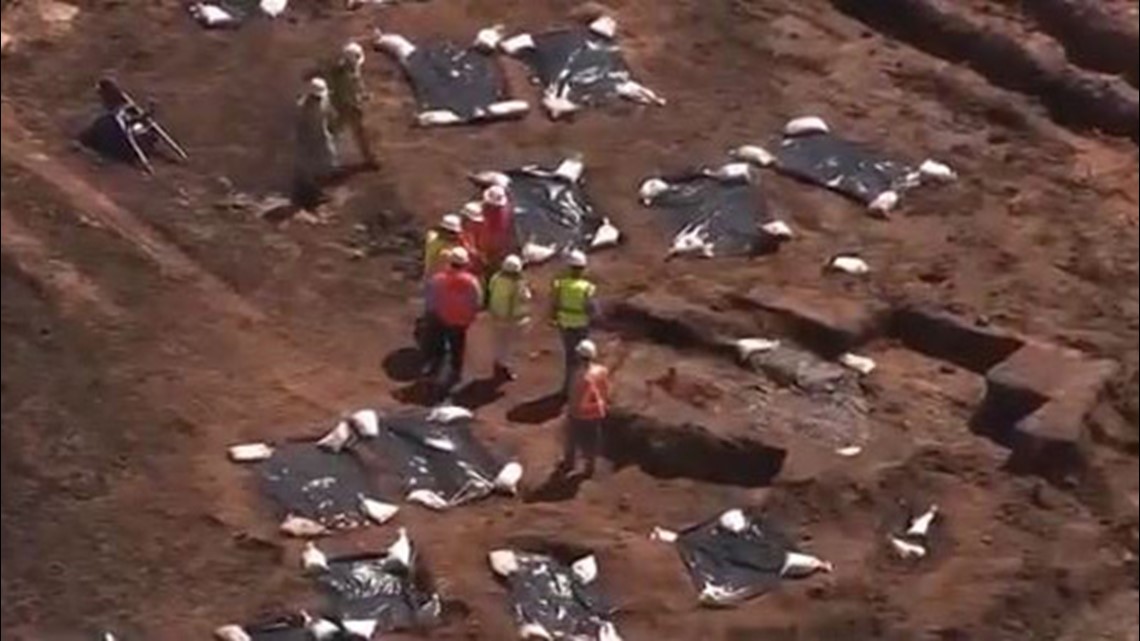
Fort Bend County Historical Commission and Fort Bend ISD are hosting a dedication of the historical marker on Juneteenth.
SUGAR LAND, Texas — The lives of 95 convict laborers forced to work on Fort Bend County plantations after the Civil War will be forever memorialized historical marker telling their story.
Their remains, dubbed the “Sugar Land 95, were unearthed by construction crews in 2018, opening a window into a dark period of Texas history.
Editor’s note: The video above originally aired in 2023.
Archaeologists say the prisoners were as young as 14, and as old as 74.
“It shows you the system was being used even against children, sometimes locking children up as even as young as 10, 11 years old,” activist Samuel Collins III told KHOU 11 in 2018.
Now, the untold story will be on a historical marker at the site where they were buried in unmarked graves.
The Fort Bend County Historical Commission and Fort Bend ISD are hosting a dedication of the historical marker on Juneteenth, and the public is invited.
The center also houses a Sugar Land 95 exhibit.
‘Their story should not be forgotten’
Crews working on Fort Bend ISD’s career and technical center nearly seven years ago unearthed the unmarked burial ground.
The disturbing discovery of the “Sugar Land 95” garnered international attention.
Research by the historical commission indicated the remains were convict laborers leased to area plantation owners Edward H. Cunningham and Littleberry A. Ellis from 1878-1909, until the site was converted into a state prison farm.
Convict labor developed to address a shortage of farm labor after the Civil War and the emancipation of enslaved people and the deaths of a quarter million men during the war.
Lawmakers used loopholes in the 13th Amendment to pass laws allowing criminal conviction of freedmen for petty crimes or behaviors, such as vagrancy.
That led to overcrowded prisons, so lawmakers turned to convict leasing, providing landowners with cheap labor in their sugar cane and cotton fields. In turn, the state made a tidy profit.
Convict leasing contracts discovered
Not long after the cemetery was found, Houston-area activists made another disturbing discovery.
Collins had been trying to shed light on the state’s convict leasing system for years. He was doing research at the Rosenberg Library in Galveston when he found duplicates of contracts used as part of the system.
The contracts are from 1891, 1893 and 1895, between the Galveston-based Ball Hutchings and Company and Texas State Penitentiary. The contracts show that the State of Texas was paid $17 a month by Ball Hutchings and Company for each inmate.
“In the contract, the No. 2 stipulation is that the convicts whose labor is to be furnished under the contracts shall be Negroes,” Collins told KHOU 11 in 2018.
The companies would house and feed the inmates. Historians, however, say these so-called “work farms” were atrocious.
It was estimated, even back then, that a convict could expect to live a mere 7 years due to the grueling labor, unsanitary conditions, and the likelihood of being shot by guards.
“They had total disrespect for the life of a prisoner, so they would work them to death and just arrest more people,” Collins said.
By the end of 1912, all contracts between state prisons and private enterprises had ended. Texas Governor Oscar Branch Colquitt is credited with making prison system reforms.
Now, 113 years later, the victims of that system will finally have their story told.
